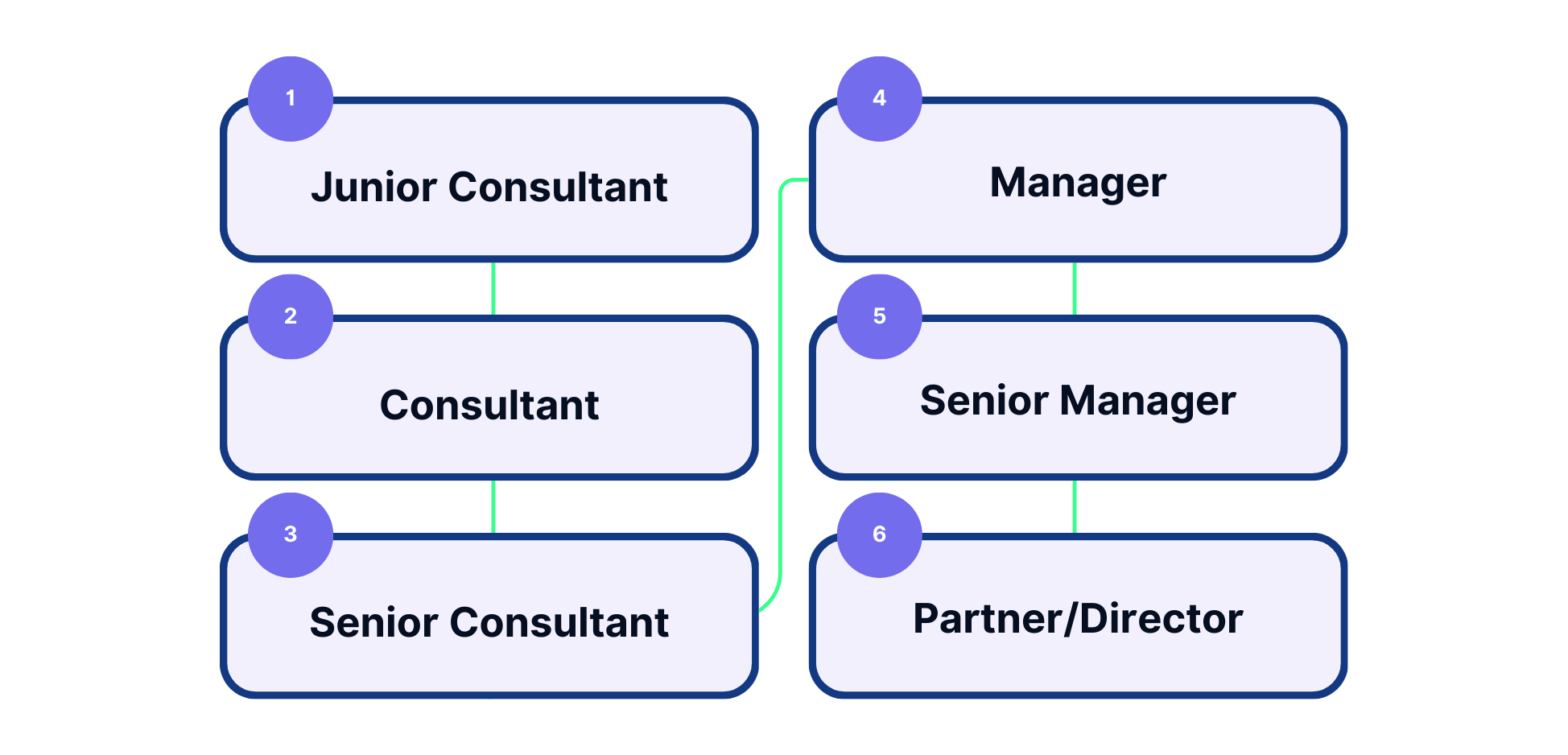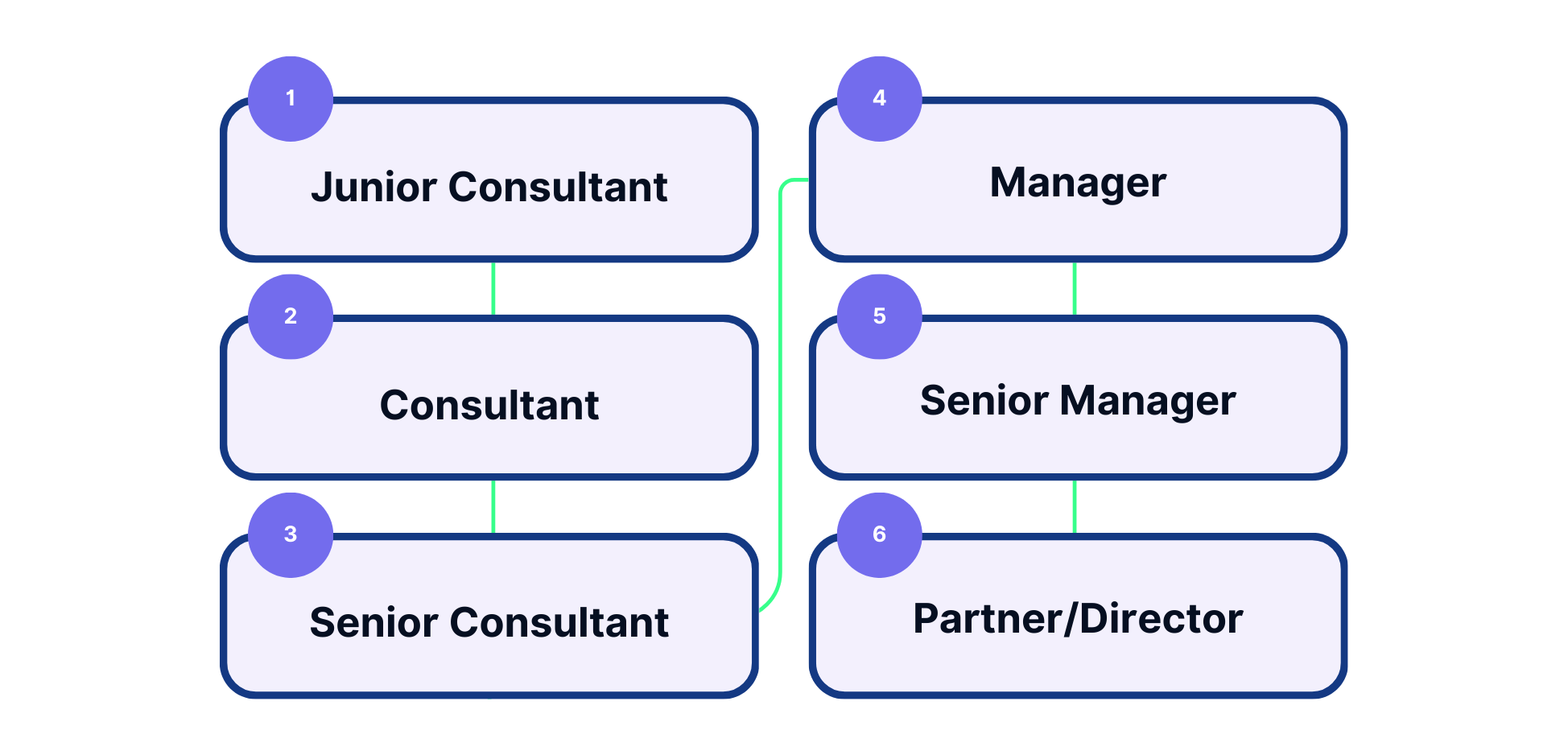Embarking on a career in consulting is a decision filled with promise, offering a diverse, dynamic, and enriching professional journey. As a consultant, you will find yourself at the intersection of business strategy and innovation, helping organizations navigate challenges and seize opportunities. The profession's allure lies in its breadth and depth - it spans industries and borders, and its rewards are equally expansive. This role requires a blend of technical skills, industry knowledge, and excellent interpersonal capabilities.
In this article, we will help you to grasp the consulting landscape, including its benefits, potential pitfalls, and strategies for you to become a successful Consultant.
How to Be a Good Consultant
Table of Contents
Qualities of a Good Consultant
Being a good consultant requires a blend of technical and soft skills. Strong communication, problem-solving, adaptability, relationship building, ethical integrity, self-management, and a commitment to continuous learning are all key traits of successful consultants. Remember, every consulting journey is unique, and these traits will develop and strengthen over time with experience.
- Strong Communication Skills:
As a consultant, you'll need to explain complex concepts in a clear and concise manner. Your audience may range from junior-level employees to senior executives, each requiring a different level of detail and technical jargon. You should be capable of adjusting your communication style according to the audience. Listening skills are equally important - understanding your client's needs, goals, and concerns is vital to providing effective solutions. - Problem-solving and Analytical Skills:
Consulting is all about problem-solving. You'll need to analyze various aspects of a problem, think critically, and come up with innovative solutions. This requires a strong understanding of business operations and industry trends, combined with the ability to analyze data and make data-driven decisions. - Adaptability:
The business landscape is ever evolving, and as a consultant, you must be able to adapt quickly. This includes staying up to date with the latest industry trends and technology, being flexible with your work schedule and tasks, and quickly understanding new clients' unique needs and operations. - Relationship Building:
As a consultant, you'll often work closely with different stakeholders, from front-line workers to C-level executives. Building strong, positive relationships with these individuals is key to your success. This requires empathy, patience, and the ability to manage conflicts diplomatically. - Ethical Integrity:
Consultants often have access to sensitive business information, and maintaining confidentiality is paramount. You should also be honest and transparent with your clients, providing realistic expectations, and avoiding over-promising. - Self-Management:
Consultants often juggle multiple projects and clients simultaneously. Excellent organizational skills and the ability to manage your time efficiently are essential. You should also be able to work independently, take initiative, and demonstrate resilience under pressure. - Continuous Learning:
The best consultants are lifelong learners. They continually seek opportunities to expand their knowledge and skills, whether through formal education, professional development courses, or self-directed learning. Staying up-to-date with the latest industry trends and technology is also crucial.
Preparing for a Career as a Consultant
The qualities of a good consultant are diverse and require time and experience. In addition to core competencies, careful preparation and specific qualifications are necessary for this demanding job. Here are some important steps and tips to successfully prepare for a career as a consultant:
1. Gain Practical Experience: In addition to the right academic education, practical experience in consulting is particularly important. Companies especially value relevant internships in consulting or in the strategy department of a DAX industrial company. Many consulting firms also offer working student positions, where you can gain valuable experience and make connections.
2. Subject-Specific Preparation for Interviews: The application process for consulting positions is often demanding and consists of several phases, including interviews and specific aptitude tests. Therefore, prepare for interviews and aptitude tests and deepen your subject knowledge.
- Practice Case Interviews: Case interviews are a central part of the selection process. These tests assess your ability to solve problems and present your thoughts in a structured and logical manner. Practice with real case studies and examples to prepare for the complex tests.
- Improve Quantitative Skills: Aptitude tests also assess mathematical and analytical skills. Prepare by practicing with test exercises and deepening your knowledge in these areas.
- Industry-Specific Knowledge: Deepen your knowledge of current trends, developments, and common methods in the industry. Before an interview, also thoroughly research the company profile. Know the history, background, and values of the consulting firms you are applying to.
3. Technical Skills: To be able to analyze data and solve problems as a consultant, technical skills are an important requirement. Basic IT knowledge, proficiency with Excel, and programming languages are essential core competencies of good consultants.
👉 Read more about the hard skills for management consulting
Benefits of a Career in Consulting
Being a good consultant will give you many benefits in your future life. The networking and challenging nature are, what makes the life of a consultant so interesting, but these six things are, what you are probably seeking right now:
- Competitive Salary:
Consulting is one of the most lucrative professions for new graduates. Firms offer competitive salaries and bonuses, recognizing the value consultants bring to their clients and the demanding nature of the job. As you gain experience and expertise, your earning potential will continue to grow, making consulting a rewarding choice from a financial perspective. - Global Exposure:
Many consulting firms operate across borders, giving consultants the chance to work with international clients and on projects around the world. This global exposure enhances cultural competence, offers insights into various markets, and broadens your professional network, which can be incredibly beneficial for career progression. - Frequent Travel:
If you have a passion for travel, consulting will align well with your interests. Client meetings, project work, and team training often involve travel, offering opportunities to explore new cities and countries. However, frequent travel can also be demanding, so it's essential to balance it with personal time to maintain a healthy lifestyle. - Variety and Learning:
Consulting offers an opportunity to work across various industries, functions, and business problems. This variety leads to continuous learning and growth. Whether it's a new industry, a unique client problem, or an innovative solution, consulting offers an exciting avenue for constant development. - Prestige and Exit Opportunities:
Consulting is a highly regarded profession, and the rigorous training that consultants receive makes them attractive to employers across sectors. Therefore, a stint in consulting often opens up a broad array of exit opportunities in areas like corporate strategy, entrepreneurship, and leadership roles in industry.
Common Pitfalls and How to Overcome Them
Despite its many benefits, consulting also presents challenges that consultants, especially those at the start of their careers, should be prepared to face:
- Managing Work-Life Balance:
Consulting can be demanding, often requiring long hours and extensive travel. To ensure a healthy work-life balance, it's crucial to master time management, set boundaries, and prioritize self-care. - Pursuing Specialization:
While there's value in being a versatile consultant, developing specialized skills can give you a significant edge. Specialization allows you to become an indispensable resource in specific areas, ensuring your continuous relevance in a changing market. - Prioritizing Soft Skills:
While technical expertise is critical, don't overlook the importance of soft skills. Skills like communication, leadership, adaptability, and problem-solving are vital for building strong client relationships and successfully working within diverse teams. - Building a Network:
Networking is crucial in consulting, as it can lead to mentorship, job opportunities, and a richer understanding of the industry. Make sure to invest time and effort in cultivating a robust professional network. - Avoiding Complacency:
The fast-paced nature of consulting requires you to stay adaptable and open to new ideas. Continual learning and innovation are the keys to staying relevant and successful in this field.
Career Development and Specialization
A career in management consulting offers numerous opportunities and challenges. To develop successfully as a consultant, one needs not only years of experience, expertise, and skills but also targeted specialization.
Advancement Opportunities and Career Paths
Career paths in consulting are diverse and offer numerous opportunities for professional and personal development. Each level has its own requirements and responsibilities, allowing consultants to develop both professionally and personally through targeted specialization and continuous education.


Junior Consultant: The entry into management consulting usually starts as a Junior Consultant. The focus here is on supporting projects under the guidance of experienced consultants, analyzing data, preparing presentations, and implementing solutions.
Consultant: As a Consultant, your responsibility grows, and you begin to independently manage projects or sub-projects. Your expertise and skills in autonomous execution are further developed.
Senior Consultant: Senior Consultants independently lead larger projects or multiple small projects simultaneously. They are responsible for the quality of the results and act as the main point of contact for clients. They specialize in a specific field or industry.
Managers: Managers are responsible for planning, executing, and monitoring large and complex projects. They lead teams of Junior to Senior Consultants and ensure adherence to schedules and budgets.
Senior Managers: Senior Managers lead large-scale projects and complex consulting engagements. They take on the development of strategies and the building of new client relationships.
Partner/Director: Partners or Directors are co-owners of the firm and are responsible for the strategic direction of the company. They are also responsible for the internal development of employees.
Specializations in Consulting
In management consulting, targeted specialization is crucial to stand out in a competitive environment and be successful in the long term. By focusing on specific industries, professional areas, or technological solutions, consultants can deepen their expertise and create higher value for their clients.
Industry Specialization: Specializing in a specific industry allows you as a consultant to gain a clear competitive advantage through in-depth expertise in various business models and market conditions, setting you apart from competitors. Whether it's finance, technology and IT, or healthcare, there are many opportunities to specialize in a particular industry.
Professional Specialization: Professional specialization in consulting refers to deepening knowledge and skills in a specific area or discipline. This specialization allows consultants to foster their professional development and build expertise in a sought-after field. For clients, the in-depth knowledge brings higher credibility and addresses their individual needs and requirements. Professional specialization can occur at various levels and includes areas such as strategy consulting, operations management, human resources, financial consulting, and more.
Technological Specialization: Extensive technical expertise is becoming increasingly important. Deepening knowledge in technological solutions, tools, and platforms enables consultants to develop innovative solutions, support digital transformations, and provide their clients with a competitive edge. Possible areas of technological specialization include data analysis and big data, artificial intelligence and machine learning, cybersecurity, and much more.
Embracing the Consulting Journey
Ultimately, a career in consulting promises a diverse, challenging, and rewarding professional journey. With a blend of strategic preparation and continuous learning, you can navigate the consulting landscape with confidence, sidestep common pitfalls, and maximize the unique opportunities consulting offers. As you embark on this path, remember that every challenge is an opportunity for growth, every case a chance for learning, and every connection a step towards success.
Continue to Learn



